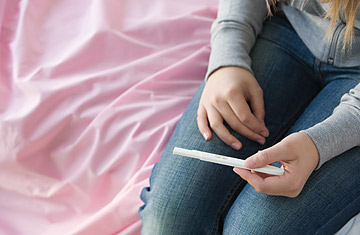
(4 of 14)
To understand the nature of the problem, one must look beyond statistics and examine the dramatic changes in attitudes and social mores that have swept through American culture over the past 30 years. The teenage birth rate was actually higher in 1957 than it is today, but that was an era of early marriage, when nearly a quarter of 18-and 19-year-old females were wedded. The overwhelming majority of teen births in the '50s thus occurred in a connubial context, and mainly to girls 17 and over. Twenty and 30 years ago, if an unwed teenager should, heaven forbid, become pregnant, chances are her parents would see that she was swiftly married off in a shotgun wedding. Or, if marriage was impractical, the girl would discreetly disappear during her confinement, the child would be given up for adoption, and the matter would never be discussed again in polite company. Abortion, of course, was not a real option for most until 1973, when the Supreme Court ruled it could not be outlawed.
All this has changed. Today if a girl does not choose to abort her pregnancy (and some 45% of teenagers do), chances are she will keep the baby and raise it without the traditional blessings of marriage. "The shotgun marriage is a relic of the past," observes Mark Testa, of Chicago's National Opinion Research Center. With teen marriages two to three times as likely to end in divorce, he explains, "parents figure, why compound their mistake?" In 1950 fewer than 15% of teen births were illegitimate. By 1983 more than half were, and in some regions of the country, the figure exceeds 75%. Unwed motherhood has become so pervasive that "we don't use the term illegitimate anymore," notes Sister Bertille Prus, executive director of Holy Family Services, a Los Angeles adoption agency for pregnant teens.
With the stigma of illegitimacy largely removed, girls are less inclined to surrender their babies for adoption. In fact, fewer than 5% do (compared with roughly 35% in the early 1960s). "In earlier times if a girl kept her child, society would treat her like an outcast," reflects Sister Bertille. "The fear and guilt are not the same as before."
Unwed motherhood may even seem glamorous to impressionable teens. "They see Jerry Hall on TV, flinging back her hair, talking about having Mick Jagger's second [out-of-wedlock] child, and saying what a wonderful life she has," bristles Daphne Busby of Brooklyn, founder of the Sisterhood of Black Single Mothers. A succession of attractive stars, including Farrah Fawcett and Jessica Lange, have joined Hall in making a trend of extramarital pregnancy, something that 35 years ago helped get Actress Ingrid Bergman blackballed in Hollywood.
